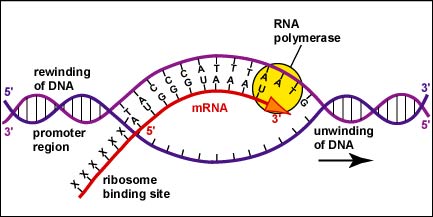April 19, 2018
The class completed the work started on Wednesday, April 18, 2018.
Showed the video clip from NOVA; One Wrong Letter. Click on the link below to view.
Tay Sachs Disease
April 18, 2018
Class assignment; Transcription and translation. Answer questions 1 - 6 on page 471 of the textbook assigned to you. There will be time in class, tomorrow, April 19th to complete the assignment.
(Do not do the analysis questions found on the same page)
Transcription analogy:
The Big Dog Bit Ted and Ran off. (Each three letter word is an analogy for a codon)
ThB igD ogB itT eda ndR ano ff ( This sentence is an analogy for what happens due to a deletion of
one of the bases of the codon)
April 17, 2018
Introduction to transcription and translation. The class was taught how to transcribed the mRNA from the DNA. They also learnt how to read the genetic code chart.
The Image below shows the transcription of the mRNA from the DNA:

The nitrogenous bases present in the RNA are:
1) cytosine
2) guanine
3)adenine
4) Uracil
(The RNA is copied from the DNA molecule.)
April 16, 2018
The following pages from Biology; A Human Approach, ( the textbook assigned), will correspond to the lessons in class. Pages 516 - 532. (The genetic code chart can be found on page 530.
The class was taught how to copy the DNA.
The DNA is double helix.
The nitrogenous bases in the DNA are:
1) cytosine
2) guanine
3) adenine
4) thymine
The base pairing rule for copying the DNA is
Cytosine bonds with guanine ( C bonds with G)
thymine bonds with adenine ( A bonds with T)
Introduction to the chapter explained the role viruses played in identifying DNA as the genetic material.
Image of a bacteriophage.
No comments:
Post a Comment
Note: Only a member of this blog may post a comment.